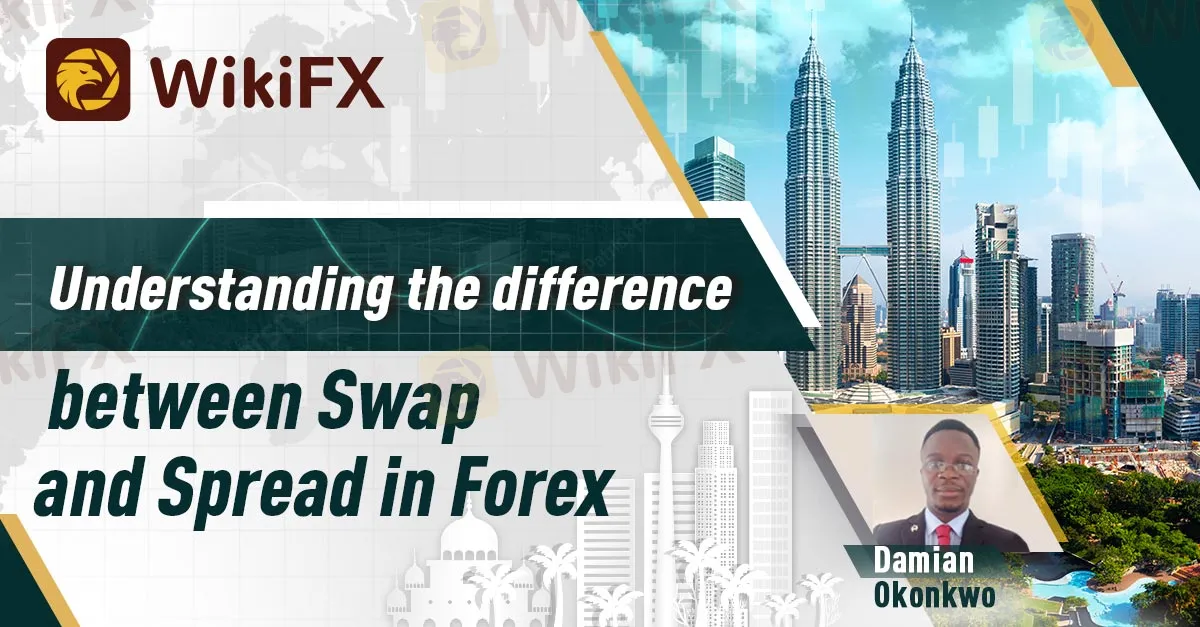简体中文
繁體中文
English
Pусский
日本語
ภาษาไทย
Tiếng Việt
Bahasa Indonesia
Español
हिन्दी
Filippiiniläinen
Français
Deutsch
Português
Türkçe
한국어
العربية
Understanding the difference between Swap and Spread in Forex
Abstract:Spread and swap generally reduce the trader's profits and available margin for trading. Only on a few occasions does the swap come as positive. The spread refers to the broker's commission for services rendered while the swap refers to the cost of holding overnight positions in the market.

By: Damian Okonkwo
What is spread?
The term spread used in forex refers to the difference between the broker's offering prices and the actual market price of the financial instrument they offer to their clients. Spread is the extra costs added to the prices of various financial instruments traded in the market by the broker while offering it to their clients which serves as his commission for services rendered. We can further define spreads as the difference between the bid and ask prices of the various financial instruments traded in the forex market today.
What is swap?
Swap is the cost of holding overnight positions in the market. Usually, some brokers place an additional cost on the trader's position when he leaves his position open at the close of each market day. The swap charges could be positive or negative depending on the interest rate for the currency pair traded.
Major difference between Swap and Spread
| Swap | Spread |
| Cost for overnight positions | Broker's commission for each position taken. |
| Could be positive or negative | Always negative |
| Depends on the interest rate of the pair traded | Depends on the type of instrument traded |
| Keeps increasing based on the number of days the position is held. | Charged once when the position is opened |
How do swaps and spreads affect the trader's position in forex?
Generally, both the spread and swap affect the trader's position negatively. Only on a few occasions does the swap come as positive. Aside from these rare occasions, both the spread and swap are known to reduce the trader's profits and available margin for trading.

Disclaimer:
The views in this article only represent the author's personal views, and do not constitute investment advice on this platform. This platform does not guarantee the accuracy, completeness and timeliness of the information in the article, and will not be liable for any loss caused by the use of or reliance on the information in the article.
Read more

The Ultimate Guide to Automated Forex Trading in 2025
Modern markets are revolutionized by automated trading systems, which now execute 70-85% of all transactions. These advanced automated trading software solutions, commonly called trading robots or Expert Advisors (EAs), leverage algorithmic precision for automatic trading across forex, stocks, and commodities 24/7. By removing emotional interference and executing trades in microseconds, auto forex trading platforms create fair opportunities for all market participants. For those new to automated trading for beginners, these systems provide disciplined, backtested strategies while significantly reducing manual effort.

Will natural disasters have an impact on the forex market?
The forex market is known for its rapid responses to global events, but the influence of natural disasters, such as earthquakes and typhoons, can be less straightforward. While headlines may scream about catastrophic damage and economic disruption, the long-term effects on currency values often depend on a blend of immediate shock and underlying economic fundamentals.

Why does your mood hinder you from getting the maximum return from an investment?
Investment decisions are rarely made in a vacuum. Aside from the objective data and market trends, our emotions—and our overall mood—play a crucial role in shaping our financial outcomes. Whether you’re feeling overconfident after a win or anxious after a loss, these emotional states can skew your decision-making process, ultimately affecting your investment returns.

How Reliable Are AI Forex Trading Signals From Regulated Brokers?
Discover how reliable AI Forex trading signals are and why using a regulated broker boosts their effectiveness. Learn key factors to evaluate accuracy and enhance your trading.
WikiFX Broker
Latest News
How Crypto Trading Transforms FX and CFD Brokerage Industry
UK would not hesitate to retaliate against US tariffs - No 10 sources
FCA Warns Against 10 Unlicensed or Clone Firms
CySEC Warns Against 14 Unlicensed Investment Websites
Top Currency Pairs to Watch for Profit This Week - March 31, 2025
Will natural disasters have an impact on the forex market?
Philippines Deports 29 Indonesians Linked to Online Scam Syndicate in Manila
Navigating the Intersection of Forex Markets, AI Technology, and Fintech
Exposed: Deceptive World of Fake Trading Gurus – Don’t Get Fooled!
AI-Powered Strategies to Improve Profits in Forex Trading
Currency Calculator







